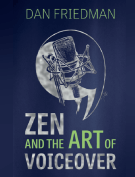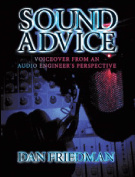 I believe that as an audio engineer, voiceover talent and author, I have a responsibility to you and to the voiceover industry to provide the best and most accurate information whenever I write a blog or am asked to share my expertise. I believe that I have a responsibility to my clients and to those who recommend me, to be the best voiceover talent that I can be. I believe in helping newcomers who have a true passion for voiceover and are willing to work hard to be among the best, as well as those who have earned my respect by demonstrating that they believe, as I do, in raising the bar for this industry. I believe in helping my friends. I believe that being a voice talent and audio engineer is not just about earning a paycheck, its also about the love I have for doing it, the pride I take in doing it to the best of my ability and the joy I get from being a part of this great industry. I believe in earning credibility through accomplishment. I believe in speed, accuracy and efficiency. I believe in being positive and I believe in honesty.
I believe that as an audio engineer, voiceover talent and author, I have a responsibility to you and to the voiceover industry to provide the best and most accurate information whenever I write a blog or am asked to share my expertise. I believe that I have a responsibility to my clients and to those who recommend me, to be the best voiceover talent that I can be. I believe in helping newcomers who have a true passion for voiceover and are willing to work hard to be among the best, as well as those who have earned my respect by demonstrating that they believe, as I do, in raising the bar for this industry. I believe in helping my friends. I believe that being a voice talent and audio engineer is not just about earning a paycheck, its also about the love I have for doing it, the pride I take in doing it to the best of my ability and the joy I get from being a part of this great industry. I believe in earning credibility through accomplishment. I believe in speed, accuracy and efficiency. I believe in being positive and I believe in honesty.
But this post isn’t about me, I promise.
So… why am I telling you what I believe? Because I also believe that many of you could be an unknowing victim of those who are self-proclaimed experts, gurus, coaches, trainers and whatever else they claim to be, when in reality they are either:
– At best, unknowing purveyors of bad information.
– At worst, knowingly trying to capitalize on people’s inexperience, emotions or desires.
– Somewhere in between
Whether you are a pro or just starting out, the possibility exists for you to lose a job or miss opportunities because you were misinformed or misguided by the ignorance of others. Worse than that would be to lose the money you already have to people who are deceptive or trying to take advantage of you.
This past weekend several pros sent emails to me that contained links to things that were either completely inexplicable or simply despicable. While we shared some laughs about what we were witnessing, the prevailing feelings were those of disbelief and frustration. For me, it is disheartening to see, read and hear things that are contradictory to ideas and concepts that I post about regularly in my blog. But what is more concerning is when bad information is being shared that, if mistakenly taken as fact, could hurt someone’s career. I don’t expect everyone to believe in the same principles that I believe in, but some of what I was reading and hearing was outrageous. In at least one instance the information being shared contradicted the laws of acoustics. 🙁
I know what you are thinking, WHO? SEND ME THE LINK! I WANNA SEE! I WANNA KNOW WHAT AND WHO YOU ARE TALKING ABOUT!
As much as I would like to share these things, I believe that it is important to let my “keep it positive” and “praise publicly, criticize privately” mantras prevail. But because it is important that everyone understand just how unbelievable some of this stuff is, without naming any names, I will share one thing to illustrate my point.
If you are one of those folks who is currently seeking voiceover coaching by searching the internet, you might just feel as though you are walking through a minefield. Whether you are new to the industry or a working voice talent wanting to further your training, the choices for coaching are vast. Type “voiceover coaching” into google and you’ll see what I mean. I see over 2 million possibilities. Even if 1% of those are relevant, that is a big number of sites to deal with.
One of these coaching sites had a post that stated it was okay to make mistakes and perform pickups whenever necessary. In the audio presentation, the speaker encouraged it. It was suggested that this could help your delivery. The “coach” actually said, “If God hadn’t wanted you to make mistakes… he wouldn’t have invented editors, editing software…(etc.)” WOW?! Now, even if this was said in jest (and I didn’t get the impression that it was), is this the kind of idea that makes any practical sense at all? If you want to share your paycheck with the editor… it might be.
A proper coach teaches how to deliver a script with all of the feeling, emotion and communicative skills required, without needing pickups to do it. Obviously we all need to pickup from time to time, but that isn’t the point. Imagine what the engineer (or editor) is thinking if your attitude as a voice artist is, “My coach told me that I can screw up as often as I need to, because the engineer will put it together.” Believe me, knowing that there is job security in working with you, will not make the engineer want to work with you even more. Not to mention that more editing requires additional studio time and that will cost your client more money. This is the antithesis of what it means to provide good customer service. Do you think this will put you at the top of the booking list?
Is this the sort of thing that a voiceover coach should be teaching? Do acting coaches teach that it is okay to forget a line or miss a mark because someone else will fix it?
What I’ve just shared with you is absolutely true. But sadly, it is also only one example of bad information out of several I could share. Furthermore, this and the other examples are things that could effect anyone at any level of their career… there is plenty of bad information to go around.
There is not much any of us can do to stop this activity and it certainly is not limited to the voiceover industry. We all know that the internet is full of both good and bad information. Complicating things even more is that the people sharing this information probably don’t know or believe they are wrong, or were just lazy and didn’t do the necessary research before making their presentation. In the example I presented above, its a matter of perspective. The “coach” is only thinking about what seems to be good for the talent (in the short term), not for the engineer/editor and definitely not for the client, which will only end up hurting the talent in the long term.
So what can we do? First, don’t be fooled by slick marketing, websites and web videos. These don’t reveal the whole story. They only reveal what the creator wants you to see and believe. Second, do some research (a seemingly lost art in this country). Usually, a little bit of additional research at undeniably reliable and factual websites will reveal whether someone knows what they are talking about or what they stand for. Use your ears. The best thing about being in voiceover is that there is usually some audio available that can help to confirm whether someone is who they say they are, that they know what they are talking about or whether they can deliver on what they promise.
Generally speaking, I don’t believe that back and forth battles in chat rooms, social media groups and forums are all that productive. Too much context can get lost and intentions can be easily misinterpreted, which has the potential to create even more and greater problems. So finally and most importantly, talk to people with first-hand knowledge of (and experience with) the people you are interested in working with, or from whom you are getting your information. Many people share the mantra “praise publicly, criticize privately” and valuable information will be revealed in private conversations. Communicate with people you trust and don’t forget to trust your own instincts as well.
In the end, it doesn’t matter what I believe or what anyone else believes. It only matters what you believe.
 There is nothing like the energy and excitement a person feels when they are starting something new… especially when that “something” is a career in
There is nothing like the energy and excitement a person feels when they are starting something new… especially when that “something” is a career in  There is a lot of talk about mic modelers in social media today. A while back, I was asked the question in regards to
There is a lot of talk about mic modelers in social media today. A while back, I was asked the question in regards to 


